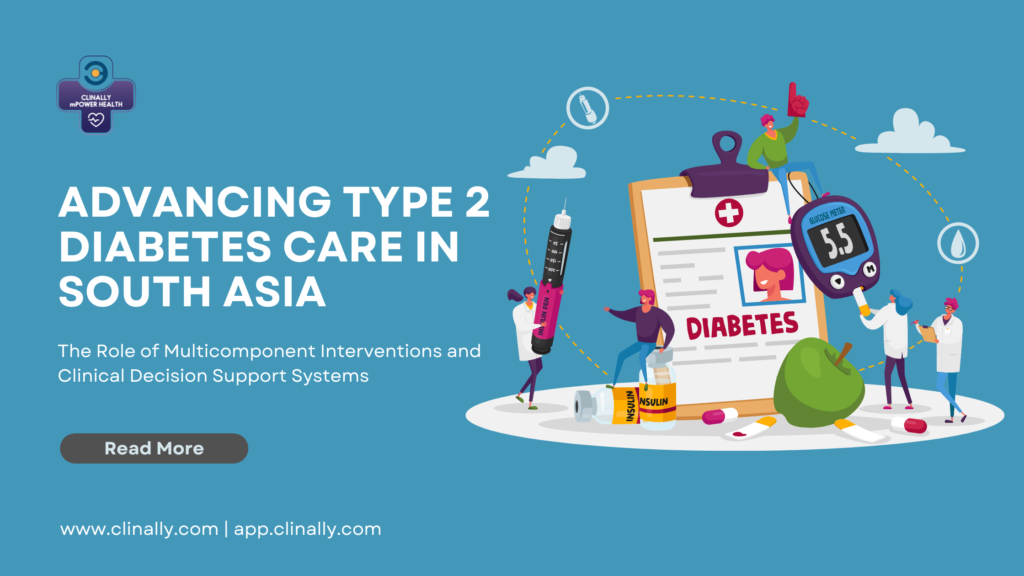Advancing Type 2 Diabetes Care in South Asia: The Role of Multicomponent Interventions and Clinical Decision Support Systems

Introduction
Type 2 diabetes mellitus (T2DM) is an unexpectedly developing health difficulty throughout the globe, with a specifically high prevalence in South Asian countries. Factors that include genetics, urbanization, sedentary life, and dietary changes have contributed to the growing burden of T2DM in this place. Addressing this project calls for a complete method that combines multicomponent interventions and progressive medical selection aid systems (CDSS). This blog submission explores the significance of those strategies in advancing T2DM care in South Asia.
The Burden of Type 2 Diabetes in South Asia
South Asia, comprising nations consisting of India, Pakistan, Bangladesh, Nepal, and Sri Lanka, is experiencing an alarming rise in T2DM cases. Genetic predisposition, coupled with urbanization-pushed changes in lifestyle and food regimen, has ended in a better susceptibility to diabetes in this region. According to the International Diabetes Federation (IDF), South Asia had approximately 82 million adults residing with diabetes in 2019, a variety of projected to upward push to 151 million by 2045. This escalating occurrence necessitates a concerted effort to manage the disease successfully.
Multicomponent Interventions: A Holistic Approach
Multicomponent interventions encompass quite a number of strategies that collectively deal with the multifaceted nature of T2DM. These interventions attention to lifestyle adjustments, pharmacological treatments, and affected person schooling. In the context of South Asia, where cultural norms and socioeconomic elements play an enormous function in health conduct, multicomponent interventions are essential for managing T2DM comprehensively.
Lifestyle Modifications: Encouraging individuals to adopt more healthier existence by selling regular bodily activity and adopting balanced diets can assist in manipulating T2DM. South Asian diets are often carbohydrate-heavy, which can cause out-of-control blood sugar degrees. Nutrition schooling and culturally tailored nutritional plans can empower sufferers to make healthier food choices.
Pharmacological Treatments: Medications play a crucial position in controlling blood sugar ranges. Healthcare vendors should not forget the affordability and availability of medicinal drugs when tailoring treatment plans. Combination healing procedures may be important to acquire target glycemic manipulation at the same time as minimizing facet consequences.
Patient Education: Empowering sufferers with information about T2DM, its complications, and self-control techniques is paramount. This involves instructing patients about monitoring blood sugar tiers, taking medicines as prescribed, and recognizing warning symptoms.
Clinical Decision Support Systems: Enhancing Precision and Efficiency
Clinical Decision Support Systems (CDSS) leverage technology to assist healthcare experts in making knowledgeable treatment choices. In the context of T2DM care, CDSS can appreciably enhance affected person effects by means of providing evidence-based suggestions and customized treatment plans.
- Risk Stratification: CDSS can check sufferers’ danger factors, medical history, and lab consequences to stratify them into risk categories. This allows healthcare carriers to become aware of high-danger folks who require intensive management.
- Personalized Treatment Plans: Based on patient statistics, CDSS can generate tailored treatment plans that remember factors inclusive of comorbidities, medicine interactions, and patient choices. This individualized technique complements remedy adherence and effectiveness.
- Real-time Monitoring: CDSS can integrate with wearable devices to provide real-time monitoring of blood sugar tiers, bodily activity, and other applicable metrics. This information can be analyzed to discover traits and intrude directly while deviations occur.
Study Findings and Implications
Baseline characteristics were similar in the intervention and usual care arms. Overall, 12.3%, 29.4%, 36.5%, 19.5% and 2.2% of participants in the intervention group and 16.2%, 38.3%, 31.6%, 11.3% and 0.8% of participants in the usual care group achieved any one, two, three, four or five targets, respectively. We noted sizeable improvements in HbA1c , blood pressure and cholesterol, and found that participants in the intervention group were twice as likely to achieve improvements in all three indices at 12 months that were sustained over 28 months of the study [relative risk 2.1 (95% CI 1.5,2.8) and 1.8 (95% CI 1.5,2.3), respectively].
Conclusions: The intervention was associated with significantly higher achievement of and greater improvements in composite diabetes quality care goals. However, among these higher-risk participants, very small proportions achieved the complete group of targets, which suggests that achievement of multiple quality-of-care goals is challenging and that other methods may be needed in closing care gaps.
Summary
Advancing Type 2 Diabetes Care in South Asia: The Role of Multicomponent Interventions and Clinical Decision Support Systems” underscores the fusion of multicomponent interventions and Clinical Decision Support Systems (CDSS) as a revolutionary approach to diabetes care. South Asia’s diabetes landscape necessitates holistic interventions that go beyond medication. CDSS empowers Clinally’s physicians with data-driven insights, facilitating informed decisions and personalized treatments. This innovative combination paves the way for scalable, personalized care that addresses the region’s diabetes challenges. As Clinally leads the charge, this transformative model promises to reshape Type 2 diabetes care, improving patient outcomes and the overall health of South Asian communities.
Shah, M. K., Kondal, D., Patel, S. A., Singh, K., Devarajan, R., Shivashankar, R., Ajay, V. S., Menon, V. U., Varthakavi, P. K., Viswanathan, V., Dharmalingam, M., Bantwal, G., Sahay, R. K., Masood, M. Q., Khadgawat, R., Desai, A., Prabhakaran, D., Narayan, K. M. V., Tandon, N., & Ali, M. K. (2020). Effect of a multicomponent intervention on achievement and improvements in quality-of-care indices among people with Type 2 diabetes in South Asia: the CARRS trial. Diabetic medicine: A journal of the British Diabetic Association, 37(11), 1825–1831. https://doi.org/10.1111/dme.14124


